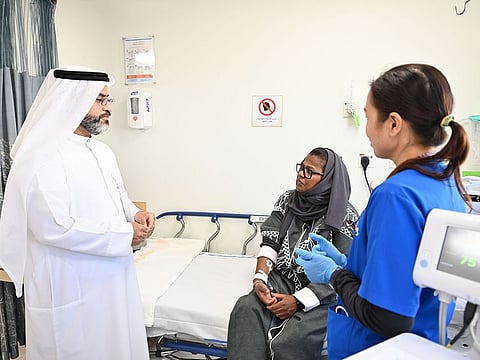Emirati patient treated for lupus with novel drug at Tawam Hospital
Monoclonal antibody therapy available with Seha cuts patients’ dependence on steroids

Abu Dhabi: A patient with lupus has expressed relief after receiving monoclonal antibody therapy, one of the latest class of drugs approved in the UAE for the treatment of the condition.
The Emirati patient, Sameeha, was diagnosed eight years ago with systemic lupus erythematosus (SLE), an auto-immune condition. Doctors found its management to be a challenge.
The new drug has been approved by the US Food and Drug Administration (FDA), and the UAE Ministry of Health and Prevention (MOHaP) and has now allowed Sameeha to cut her dependence on steroids to control symptoms.
Monoclonal antibody
The medicine, known as monoclonal antibody, is delivered as an infusion, and is being administered at Tawam Hospital, which is part of the Abu Dhabi Health Services Company (Seha) network in Al Ain.
“The patient’s disease was uncontrolled for several years despite treating her with different medications," said Dr Khalid Al Naqbi, Consultant and Chief of Rheumatology at Tawam, and Adjunct Associate Professor at the UAE University.
"Lupus is a non-communicable autoimmune disease that may affect any part of the body due to antibodies produced by the body against certain tissues. The disease affects more females than males, and may affect all ages, but it is often diagnosed in the 15 to 45 age group,” said Al Naqbi.
Risk factors
“The cause of the disease is still unknown, but many factors increase the likelihood of disease development, including genetic predisposition, exposure to ultraviolet light, hormonal imbalances, smoking, air pollution, obesity, post-traumatic stress, vitamin D deficiency, interferon, viruses, microbiome, and side effects of some medicines,” the doctor said.
Lupus can affect different parts of the body. Symptoms may be mild or moderate, such as rash, excessive hair loss and headache. It is also unresponsive to painkillers, triggers arthritis, low cell counts, blue fingers or toes upon exposure to cold or during periods of psychological stress, or dry eyes.
In severe cases, patients may find their blood vessels, liver, kidney or nervous system affected.
Difficult symptoms
“I did not discuss my disease with my family or close friends. I was diagnosed 8 years ago and I saw different doctors in many hospitals. I decided to seek medical advice from Dr Al Naqbi at Al Ain hospital, then I followed up in his clinic at Tawam hospital. I was treated with all available medications due to difficulty controlling my lupus, and I had to keep taking many drugs including steroids,” Sameeha said.
“Living with this disease has been challenging, but the support from Dr Al Naqbi and his team helped me tremendously to cope up. I’m glad I finally stopped taking steroids after years of taking it. I would like to express my sincere gratitude to Dr Al Naqbi and his team for their exceptional care,” she said.
The new treatment for lupus is now available at Seha healthcare facilities. Dr Al Naqbi emphasised the importance of adherence to medications, doctor’s advice, clinic appointments, and follow-up tests in order to avoid complications of the disease.
Sign up for the Daily Briefing
Get the latest news and updates straight to your inbox



